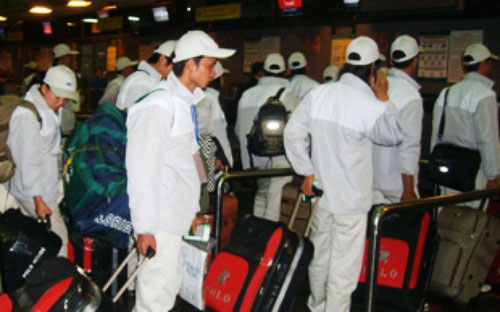Vietnam again risks losing Korea labour export rights

illustration photo
Korea has suspended the employment permit system (EPS) programme before when it came to light that 58 per cent of Vietnamese workers took on illegal jobs after their contracts expired.
This led to 12,000 Vietnamese workers, who had successfully passed the required Korean language test, being unable to take their expected jobs overseas.
The South Korean side has confirmed that if Vietnam doe not successfully reduce the number of workers who stay illegally, the government would officially shut down the EPS. Korea is a key market for Vietnamese workers with a demand of around 10-15,000.
In an effort to salvage the situation, the Ministry of Labour, Invalids and Social Affairs (MoLISA) conducted a media campaign and advised the government impose stricter regulations on illegal workers.
The government’s current procedures include Circular 35/2013, dated August 22, 2013, regulating workers deposit VND100 million ($4,760) as a guarantee against them not returning.
If the workers flee their jobs and/or work illegally after their contracts are up, their deposit would be void.
The circular includes an additional fine of the same amount, applicable to workers who illegally stayed in Korea before August last year, that is collected when they return or are brought back to Vietnam.
To encourage illegal workers to return home, the circular stated that if they did so before March 10, they would not be fined.
According to Le Duc Long, deputy director of Abroad Worker Centre under MoLISA, after the government imposed stricter management, the percentage of illegal workers dropped to 38 per cent by October 2013, from the previous 58 per cent.
Thanks to these improved results, in late December 2013, a special Memorandum of Understanding was signed by the labour ministries of both countries that implemented a precursor to an EPS programme which prioritised workers who returned home on time when their contracts expired and who again passed the Korean language test in 2014. They listed a quota of 2,900 workers. The other part of the agreement was that if Vietnam continued reducing the number of its illegal workers in Korea, the EPS would be restored.
But the drop lasted only a short time and Long said that the percentage of illegal workers recently rose to 49 per cent. He added that this could easily result in Korea suspending the programme again, or even stopping it forever.
According to Choi Byung Gie, director of EPS Vietnam, so far more than 14,000 Vietnamese labourers are working illegally in South Korea, accounting for 40 per cent of total illegal workers in a country with 14 EPS partner states.
This percentage led Vietnam to overtaking Cambodia as the country with the most illegal workers in South Korea.
According to Gie the $4,800 deposit is not small, but workers know they can earn the equivalent in just three months and continue working illegally.
According to a report from South Korea, 16 per cent of total export labourers in the country borrow money at very high interest rates to pay for their immigration. They are forced to work illegally to pay off the debt in full.
The group of people who borrow to immigrate are by far the most prolific segment of runaways. The report suggested government or regulated loans for workers could help stymie the problem.
What the stars mean:
★ Poor ★ ★ Promising ★★★ Good ★★★★ Very good ★★★★★ Exceptional
Latest News
More News
- Congratulations from VFF Central Committee's int’l partners to 14th National Party Congress (January 25, 2026 | 09:46)
- List of newly-elected members of 14th Political Bureau announced (January 23, 2026 | 16:27)
- 14th Party Central Committee unanimously elects To Lam as General Secretary (January 23, 2026 | 16:22)
- List of members of 14th Party Central Committee announced (January 23, 2026 | 09:12)
- Highlights of fourth working day of 14th National Party Congress (January 23, 2026 | 09:06)
- Press provides timely, accurate coverage of 14th National Party Congress (January 22, 2026 | 09:49)
- Press release on second working day of 14th National Party Congress (January 22, 2026 | 09:19)
- Minister sets out key directions to promote intrinsic strength of Vietnamese culture (January 22, 2026 | 09:16)
- 14th National Party Congress: Renewed momentum for OVs to contribute to homeland (January 21, 2026 | 09:49)
- Party Congress building momentum for a new era of national growth (January 20, 2026 | 15:00)
















 Mobile Version
Mobile Version